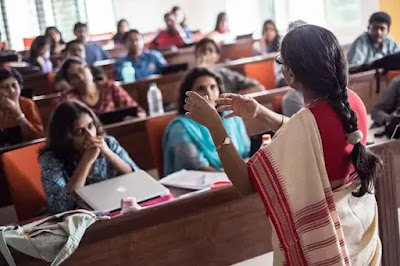Indian Higher Ed: Indian or Global?
However, an interesting conversation with an young colleague made me pause and think. Her point, on reading India's new National Education Policy, was that the policy talks a lot about being Indian while promising to prepare Indian graduates for the global workplace. She saw this as an anomaly and hoped I would agree!
But here is my own confusion perhaps. I do think Indian education should be more Indian. I actually find the educated Indians disdain for their own countrymen disconcerting and believe that this is a crucial weakness of the Indian society. It weakens India as the Indian middle classes are increasingly disconnected from the real problems of their own country and try out various Made-in-America solutions rather than thinking on their own. And, I believe education, and particularly Higher Education, plays a crucial part in creating the problem.
Now, there is more than just this in the National Education Policy. It only emphasises the need to make Indian education more Indian, it also contains what being Indian means. Therein lies the divergence: The idea that India as a perennial playground of global connections, lying inbetween the Silk Road and the Indian Ocean, wouldn't fit into the mould of Hindu/Hindi civilisation that the policy essentially envisages. In my mind, there is no conflict between being more Indian and yet being more connected globally.
At this point of the argument, we should perhaps also look closely at the meaning of 'global', as it is understood in common usage. We all use it quite loosely, as does the policy document itself. The 'global' in this common use is based on an Anglo-American idea of the world, some sort of rump empire carrying on the colonial business. India was at the centre of the British Empire and its influences - on ideas, organisation structures and values - remain deep and persistent. The globality in Indian mind assumes history playing out in stages, with industrial Britain and post-war America at the highest rung of that civilisational order. Everyone else is somewhere along the way, trying to achieve that nirvana of technologically enabled superiority. This is, in summary, the idea of 'global' in the context of this particular policy document is Anglo-American (and European, more broadly speaking) and therefore, it doesn't sit well with 'Indian'.
But this concept of global is also changing, as the Anglo-American influence wanes. This is not about multipolarity in the geopolitical sense; the United States still remains the pre-eminent military power and the Anglo-American dominance in global finance will last a few more recessions. But the erosion is visible in terms of its moral superiority, in terms of values that most people in the world live by. It does seem that the Russians, the Chinese and increasingly the Indians are accepting that they have to find their own system of values and organisational forms outside the forms prescribed in English textbooks. The inequity in global power share is obvious, a new type of politics emerging through social media and a new national elite is challenging the cosmopolitan assumptions of the old elite. This is breaking the consensus around the America-led ideas and increasingly, the Anglo-American power has to depend on flexing the military and monetary muscles rather than eager embrace of ist value systems.
This, in my mind, is leading to a fracture in the idea of globalisation, which we sleepwalked into. In my view, for Indian higher education in the next 20 to 30 years, the discussion should start with challenging both the narrow ideas - of Indianness and of what global means. This should be a forward-looking, rather than rear-view, enterprise. Only by doing this, we can move beyond the Indian-vs-Global binary and let the new generation of Indian students define their own path to destiny.


Comments